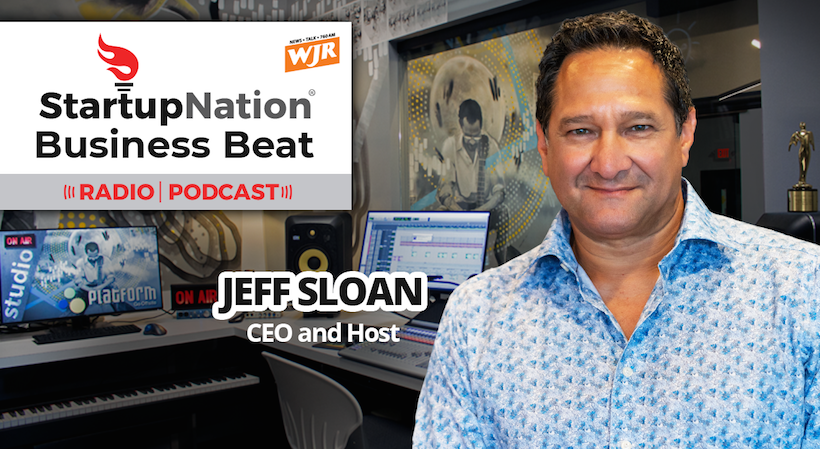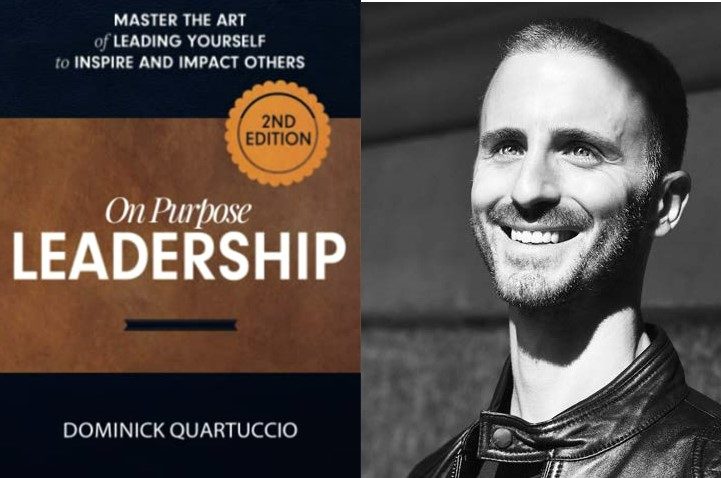StartupNation |
| WJR Business Beat: Shoppers Consider Brand Purpose In Their Purchase Decisions (Episode 327) Posted: 30 Nov 2021 08:38 AM PST
On today’s Business Beat, Jeff discusses a new report saying 82% of consumers are making their purchases decision this holiday season based on what a brand stands for and how they feel about that brand. Tune in to the Business Beat, below, to learn more about what brands need to do to capture the allure of purpose:Tune in to News/Talk 760 AM WJR weekday mornings at 7:11 a.m. for the WJR Business Beat. Listeners outside of the Detroit area can listen live HERE. Are you an entrepreneur with a great story to share? If so, contact us at editor@startupnation.com and we'll feature you on an upcoming segment of the WJR Business Beat! Good morning, Paul! Well, the sounds of the holidays are ringing loudly and here on the Business Beat, the ringing we care about is the ringing of those cash registers of our local merchants. And while most of us think deals and promotions are key purchase drivers, and no doubt they play a lead role, they aren’t the only way to earn the hearts and minds of consumers and get them to shop and buy with and from you this holiday season. Now a new report published by Razorfish and Vice Media Group indicates 82% of consumers are making their purchase decisions this holiday season with purpose in mind. In other words, they are making purchase decisions based on what a brand stands for and how they feel about that brand. According to the research, shoppers believe so strongly in the sense that brands should have a purpose that the brands that they support should have a greater mission or have a higher purpose that includes using brand equity to make the world a better place. Interestingly, the report also makes clear that purpose is amplified by proximity. Forty percent of respondents stated that shopping locally became more important to them during the pandemic. Nicolas Chidiac, brand strategy leader of Razorfish, had this to say about the findings of the report. "It’s clear that it is now imperative for brands to not only clearly communicate their purpose, but authentically put it into practice of everything they do. Brands in the post-COVID era, have the opportunity and, in a sense, an obligation," he says, "to match their words with positive action." Now Razorfish recommends that brands act on these following three priorities to keep pace with the changing consumer sentiment toward purpose and their desire to purchase. No. 1, be authentic. No. 2, take small steps before big leaps by focusing on what you can do to have an immediate impact on your local community. It’s better to do than just talk about what you want to do. And three, reduce the time it takes for consumers to discover your purpose by displaying it across all touch points. So if you’re a local merchant wanting to hear more ringing of those cash registers this holiday season, make sure you’re appealing to the new post-COVID era consumer who is now demanding a strong brand purpose as a key determinant in whether or not they shop with you. I’m Jeff Sloan, founder and CEO of startupnation.com, and that’s today’s Business Beat on the Great Voice of the Great Lakes, WJR. The post WJR Business Beat: Shoppers Consider Brand Purpose In Their Purchase Decisions (Episode 327) appeared first on StartupNation. |
| Business Leaders Need to Master These 2 Problems Posted: 29 Nov 2021 09:00 PM PST
Excerpt from “On Purpose Leadership: Master the Art of Leading Yourself to Inspire and Impact Others” by Dominick Quartuccio. Copyright © 2021 Dominick Quartuccio. Reproduced by permission of TCK Publishing.
As someone who has worked with hundreds of leaders and teams, in both business and personal environments, I see two connected problems in how leaders, like Whitney, are leading today. PROBLEM #1: Leaders are trying to lead others before mastering the art of leading themselves. Leaders always ask me the same three questions:
If you've paid close enough attention, you'll realize there's a fatal flaw in all of these questions: They assume the answers lie within the followers, not the leader. There are legions of leaders today running around and pointing the finger at everyone else but themselves when it comes to leading change, doing what's uncomfortable and executing on the most important priorities. There are a select few who point those fingers at themselves first. These are what I call On Purpose Leaders. On Purpose Leaders know their "why," make every decision with intentionality, and live the example they wish to inspire in others.
It simply doesn't work this way. Every inconsistency, blind spot, gap in integrity, and substandard behavior you have in leading yourself will be amplified in the levels beneath you. This will be showcased in your teams' behaviors and results. You must master the art of leading yourself before you can effectively lead others.
PROBLEM #2: You cannot master the art of leading yourself without connecting to your purpose, and you cannot see your work as the enemy to purpose. Executives, entrepreneurs, and community leaders constantly speak to me about their growing desire to fi nd a deeper sense of purpose in their lives. They want more than just a career and a paycheck. They are seeking meaning, fulfillment, and aliveness. Don't you? But perhaps you've been sold a story that you're only truly free to pursue purpose once you're financially independent. Either that or you must disrupt an unreasonable amount of your life for work that pays little or far less than what you earn presently. Many of the people I speak to believe purpose is some unattainable fantasy that exists in a parallel universe or must be a massive undertaking that'll take years or decades to realize. They see their present-day work as the enemy; a necessary evil to meet mortgages, accelerate careers, and support families. They'd really rather be doing something else. Again, how about you? If you're disconnected from a sense of purpose, then an essential part of your life force is left untapped! You are leading with only a fraction of your potential. Your teams will feel it. Your results will reflect it. You cannot master the art of leading yourself without connecting to your purpose.
Act now! Why it’s important you act, now!To explain why these two problems are such an issue, and why you must do something to change right now, let me tell you another story. For the first 15 years of my career, I led sales teams in the high-pressure world of financial services for Prudential, a Fortune 100 firm. After leaving the industry to start my own consulting business, I've made a big part of my living coaching, speaking to, and training the financial services industry. Over these last two decades, I've witnessed tremendous change ripple through an industry that was predicated on – and quite frankly, addicted to – stability. There's been a dramatic shift in industry regulations, which has led to margin compression, rapid consolidation, and mass layoffs. This has resulted in much more work on the backs of far fewer people. Before that shift, this was an industry where people spent their entire 30-, 40- and even 50-year careers without much dramatic change. Movements were incremental. Managing what already existed – which was often multiple billions of annual revenue – was valued over leading change, which could often bring risk and disruption. All of a sudden, the industry found its financials shifting rapidly, but its people were still largely clinging to the All of a sudden, lifelong "managers" were being asked to lead change in organizations filled with people who'd been raised in a culture of preserving the status quo. These managers would say all the right things, but their teams wouldn't respond because the manager wouldn't That's when I noticed a troubling theme emerge: These managers were embodying the very behavior they wished to change in their people. Like Whitney from the opening story, they themselves still had deeply rooted desires for comfort, stability, and sticking with what's always worked for them. They welcomed change, as long as it was incremental and felt safe. But their businesses demanded transformational change. This isn't just relegated to financial services. Every industry is under tremendous pressure to adapt, grow, and speed up in accordance with our technologically hyper-charged and ever-changing world. There's a second big theme that's emerged as I've worked alongside leaders of all businesses: More and more people are seeking a deeper sense of purpose in their lives and view the all-encompassing demands of their work to be the barrier to meaning and fulfillment. People are working longer hours, always connected to their devices and with a relentless emphasis on nonstop productivity. That never-ending, intense pressure is causing people to ask: "Is this worth it?" As people are grinding their ways to better business results at the expense of their health, relationships, and personal freedoms, the need for a deeper sense of purpose becomes increasingly more crucial to staying fully engaged in their lives. — I've worked with incredible leaders – like Whitney – who came to the awakening that all of the success of their leadership hinged upon looking inwards first. When you connect to purpose and master the art of leading yourself, leading others becomes easier and more fulfilling. Your mere presence will inspire others to raise their standards and meet you where you're at. This book is your guide to leading On Purpose. It requires you draw a line in the sand, right now, and step into a new way of leading. "On Purpose Leadership: Master the Art of Leading Yourself to Inspire and Impact Others" is available now and can be purchased via StartupNation.com.
The post Business Leaders Need to Master These 2 Problems appeared first on StartupNation. |
| You are subscribed to email updates from StartupNation. To stop receiving these emails, you may unsubscribe now. | Email delivery powered by Google |
| Google, 1600 Amphitheatre Parkway, Mountain View, CA 94043, United States | |


No comments:
Post a Comment